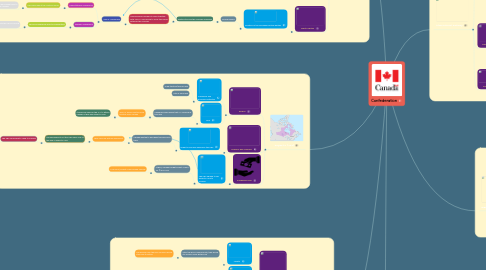
1. Political Deadlock
1.1. Issues
1.1.1. Disagreements
1.1.1.1. Transportation
1.1.1.1.1. Canada West
1.1.1.1.2. Canada East
1.1.1.2. Representation by population
1.1.1.2.1. Canada West
1.1.1.2.2. Canada East
1.1.2. Number of seats
1.1.2.1. Canada West and East had the same number of seats
1.1.2.1.1. There couldn't have been a majority on either side
1.2. Major People Involved
1.2.1. George Brown
1.2.1.1. Canada West
1.2.1.1.1. Leader of the Liberals party
1.2.1.1.2. Spokesman
1.2.1.1.3. Politician
1.2.1.1.4. Representative in the legislature for Toronto
1.2.2. John A. Macdonald
1.2.2.1. Canada East
1.2.2.1.1. He understood George Brown was doing everything to help Canada West
1.2.2.1.2. He also knew George-Étienne Cartier was fighting to protect the Canadiens
1.2.3. George-Étienne Cartier
1.2.3.1. Lawyer
1.2.3.2. Entered politics in 1848
1.2.3.2.1. Leader of The Bleus party
1.3. Great Coalition
1.3.1. Coalition of the Canadian political parties
1.3.1.1. George Brown
1.3.1.1.1. Wanted to solve the colonies' problems
2. Rupert's Land
2.1. Reason
2.1.1. Canadians saw economic potential
2.1.1.1. Huge territory/area of land
2.1.1.2. Lots of farm land
2.1.2. Fear
2.1.2.1. Canadians were afraid that U.S. would buy this land
2.1.2.1.1. The U.S. would control more territory near Canada
2.2. Hudson's Bay Company
2.2.1. Rupert's Land was owned by the HBC
2.2.1.1. Canada wanted to purchase this land from them
2.2.1.1.1. They came up with an agreement
2.3. Purchasing Land
2.3.1. The HBC agreed to sell Rupert's Land to Canada
2.3.1.1. In1869, Canada bought Rupert's Land for $1 500 000
2.3.1.1.1. As a result, Rupert's Land joined Canada
3. Great Britain
3.1. Benefits
3.1.1. Loyalty
3.1.1.1. After the BNA colonies unite, they would still remain under British rule
3.1.1.1.1. The people from the BNA colonies would stay loyal to Britain
3.1.2. Protection
3.1.2.1. The U.S.
3.1.2.1.1. The U.S most likely wouldn't attack the BNA colonies if they joined together under one government
3.2. Encouraged Confederation
3.2.1. Britain wanted their colonies to be independent
3.2.2. Britain didn't want to be too involved in their colonies' government anymore
3.2.2.1. It took up too much of their time
3.2.2.1.1. Britain thought that if the BNA colonies joined, they won't need to worry about them anymore
3.2.2.2. It was exspensive
3.2.3. London Conference
3.2.3.1. Last conference that led to Confederation
3.2.3.1.1. Many agreements towards Confederation were reached
3.3. The U.S.
3.3.1. Fear
3.3.1.1. Britain helped support the South (the Confederacy) during the American Civil War
3.3.1.1.1. There was a lot of tension between BNA and the Union
4. Intercolonial Railway
4.1. Purpose/Reason
4.1.1. Cancellation of the Reciprocity Treaty
4.1.1.1. Trade between the BNA colonies and the US stopped after
4.1.1.1.1. BNA colonies wanted to replace their previous trade with an internal trade
4.1.2. Intercolonial Trade
4.1.2.1. Trading would be more efficient between the BNA colonies
4.1.3. Transportation
4.1.3.1. Transportation between colonies would be easier
4.1.3.2. Military defenses
4.1.3.2.1. Soldiers can travel to places quicker
4.1.4. Economy
4.1.4.1. Railways can make lots of money and profits
4.1.4.2. Economy will grow
4.2. Problems
4.2.1. Money
4.2.1.1. Investors of the Railway needed to borrow a large amount of money from a bank in London
4.2.1.1.1. British banks had to be sure they would be repaid
4.2.2. Prince Edward Island
4.2.2.1. This Railway wouldn't go through PEI
4.2.2.1.1. PEI still had to pay taxes for the Railway even if it didn't benefit them
4.3. Solutions
4.3.1. PEI's railway
4.3.1.1. After Confederation, Canada helped pay for PEI's own railway
4.3.1.1.1. As a result, PEI agreed to join Canada
4.3.2. Joining together
4.3.2.1. People started to expand the Intercolonial Railway soon after Confederation
5. Reciprocity Treaty
5.1. Benefits
5.1.1. BNA and U.S.
5.1.1.1. Tariffs
5.1.1.1.1. Reduction of tariffs
5.1.1.2. Free Trade on resources
5.2. Problem
5.2.1. End of treaty (1866)
5.2.1.1. The U.S.
5.2.1.1.1. The U.S. thought BNA benefited a lot more than it was supposed to
5.2.1.1.2. They didn't like how the manufactured important from the Canadas required tariffs
5.2.1.1.3. Revenge on Britain for helping the South in the American Civil War
5.3. Solution
5.3.1. Uniting the colonies
5.3.1.1. This could establish a strong internal trade between the BNA colonies
5.3.1.1.1. This intercolonial trade could replace the trade they had with the U.S.
6. American Expansion
6.1. US Invasion
6.1.1. Fenians
6.1.1.1. Irish organization in the US
6.1.1.2. Wanted to overthrow British rule in Ireland
6.1.1.3. Decided to attack the BNA colonies for revenge
6.1.1.3.1. The Fenians invaded Canada East a few times
6.1.2. Manifest Destiny
6.1.2.1. Belief of the US taking over North America
6.1.2.1.1. The US could've used this as an excuse to invade the BNA colonies
6.2. BNA colonies & Others
6.2.1. New Caledonia
6.2.1.1. Got along with Americans
6.2.1.2. Other colonies were afraid New Caledonia would join the US
6.2.2. Canada West
6.2.2.1. They felt they were in danger
6.2.2.1.1. This is because Canada West was closer to the US
6.2.3. Canada East, PEI, and New Brunswick
6.2.3.1. They also felt that they were put at risk
6.2.3.1.1. This is because of the amount of land they had, that America wanted more of
6.3. Security
6.3.1. BNA colonies wanted more protection against the US
6.3.1.1. In order to do so, BNA colonies had to unite together

